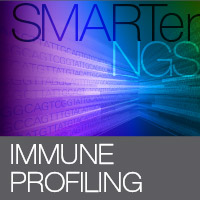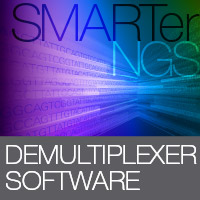SMARTer Human scTCR a/b Profiling Kit—elucidate alpha-beta chain pairings of T-cell receptors in single cells

Although sequencing of bulk T cell samples has helped to further understanding of T-cell receptor (TCR) repertoire diversity, bulk sequencing cannot determine the pairing of specific alpha-beta receptor chains within the population of T cells. Since the unique alpha-beta pairing of a TCR mediates antigen specificity, obtaining pairing information will be crucial for providing insights on antigen recognition. While sequencing of single T cells can determine the pairing on a given cell, it can be prohibitively expensive and involves complicated analyses since most methods require sequencing of a large number of cells.
Although sequencing of bulk T cell samples has helped to further understanding of T-cell receptor (TCR) repertoire diversity, bulk sequencing cannot determine the pairing of specific alpha-beta receptor chains within the population of T cells. Since the unique alpha-beta pairing of a TCR mediates antigen specificity, obtaining pairing information will be crucial for providing insights on antigen recognition. While sequencing of single T cells can determine the pairing of a given cell, it can be prohibitively expensive and involves complicated analyses since most methods require sequencing of a large number of cells.
With the SMARTer Human scTCR a/b Profiling Kit, we solve this problem by performing SMART cDNA synthesis with a set of unique indexed oligos that allow the condensing of 96 samples, which have been sorted manually or via FACS, into twelve pools for sequencing. Additionally, the approach enables the twelve pools to be further multiplexed such that all 96 samples are run in a single flow-cell lane. Much like the SMARTer Human TCR a/b Profiling Kit for bulk samples, this kit combines SMART cDNA synthesis and RACE-based PCR, followed by TCR gene-specific PCR to fully capture and amplify TCR-alpha and TCR-beta variable regions to generate Illumina-ready libraries that provide a highly sensitive approach to sequencing TCRs.
If you are looking for the software to demultiplex your sequencing data generated with this kit, please visit the SMARTer Human scTCR Demultiplexer webpage.
Overview
- Flexible workflow: Illumina-ready libraries from FACS or manually sorted single cells
- Ease of use: optimized indexing allows for pooling 96 cells into twelve libraries which can be further multiplexed for running in a single flow-cell lane
- Sensitivity: RACE-based approach allows for the detection of low-abundance TCR variants
- Specificity: full-length reads, with the majority of reads on target and accurate pairing information
More Information
Applications
- Human TCR repertoire analysis in single cells (TCR-alpha and TCR-beta subunits)
- TCR alpha-beta pairing determination in single cells
Additional product information
Please see the product's Certificate of Analysis for information about storage conditions, product components, and technical specifications. Please see the Kit Components List to determine kit components. Certificates of Analysis and Kit Components Lists are located under the Documents tab.
Takara Bio USA, Inc.
United States/Canada: +1.800.662.2566 • Asia Pacific: +1.650.919.7300 • Europe: +33.(0)1.3904.6880 • Japan: +81.(0)77.565.6999
FOR RESEARCH USE ONLY. NOT FOR USE IN DIAGNOSTIC PROCEDURES. © 2025 Takara Bio Inc. All Rights Reserved. All trademarks are the property of Takara Bio Inc. or its affiliate(s) in the U.S. and/or other countries or their respective owners. Certain trademarks may not be registered in all jurisdictions. Additional product, intellectual property, and restricted use information is available at takarabio.com.




